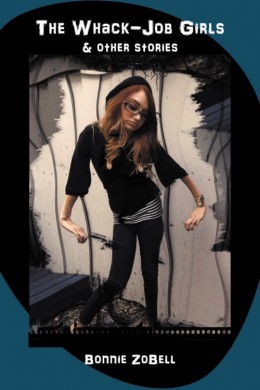
Monkey Puzzle Press
58 pgs. / $10.00
Review by Matt Pincus
The Whack-Job Girls & Other Stories is a chapbook compiled from flash fiction pieces, the nouveau riche vignettes of current literature. ZoBell, in an interview with Rumjhum Biswas says, “Every single story came from prompts in the Flash Factory at Zoetrope Virtual Studio.” She goes on to say that prompts are ways for her to write about characters, scenarios, or themes she would normally not conceive or imagine.
Although this is true for most authors, ZoBell is able to capture a poetic lyric in short narratives of socially and economically outcast women in her text: the maid working at an upscale hotel called upon to attend to a room at three AM, or the Midwesterner from Spokane who rides a train to Harlem when “the only black people [she] ever saw were Crips and Bloods in movies of the week.” These stories develop their characters’ personal situations (a mother having phone sex for extra income or a woman who sells her Mustang to pay the credit card bill) but there is also a layer of gothic séance, which produces a feeling one gets from a Denis Johnson or Shirley Jackson novel.
An obvious example of the gothic is the gargoyles in the third story, “You Are Not Langston Hughes,” but spectral themes are also found in “Nonnie Wore No Clothes” and the title story, “The Whack Job Girls.” The opening sentences of “Nonnie Wore No Clothes” describe Nonnie’s vision of a Madonna on the wall: “Moisture seeped from the corner of these eyes. A brown smudge was the nose, a smear in the shape of a heart clearly stood for the mouth.” Zobell invites the reader to believe in the character’s vision until her son comes home, and bluntly says, “‘It’s not a face, Ma. The walls are leaking like they did last winter.” Crafting the child as a realist and the mother as a dreamer complicates the social structure of the text. One should feel for the neglected son, but instead the story invokes pity for the mother’s conflicted vision.
“The Whack-Job Girls” starts with a photo of a sinister looking woman with eyeglasses doing another lady’s hair. The text begins with Kitty and other hairdressers of a small-town barbershop angry with their men after having read O (Oprah’s magazine): “Every last one of them has realized Flashtown is behind the times in the man/woman department.” The sarcasm of middle-aged women finding feminist reclamation through Oprah reads in sharp contrast to the nails, scissors, extensions, and “coiling reptiles” of the salon. The edges of text invoke a vicious fantasy of what the women desire to commit against “the Short Fuse Dudes,” a parallel group of Flashtown men, but leaves the reader with a rhyme about cold Top Ramen as a metaphor for their love and care.
Further, as the collection progresses, the language of stories like “Serial” and “The Writer as Rapist” grows to become a revenge-like narrative mix of cerebral fantasy instilled in violence. A woman writer attempting to create a male character who rapes women in the shower says, “While washing, he invents them—painter women whose drips drop only on the feminine sways of their bodies and who imagine artistic ways to make love.” The writer, by creating an imaginary rapist, reclaims the power struggle of the man’s gaze onto feminine objectification. A few lines later, in some of ZoBell’s most poignant prose, the narrator says, “The poet writes odes, building him up, making him feel grand, until she has her way with him.” The imaginary possession, and the reclamation of her ‘artificial’ control over his violence, makes the writer’s (narrator or ZoBell’s) femininity all the more powerful.
Each story vacillates from first to second to third person, from small town to big city, from a cramped apartment to the bed of a husband with sleep apnea. The variation of theme, socio-economic status, point of view, familial, or personal relationships leaves room for a multiplicity of readers’ interpretation and experience. The Whack-Job Girls is a “whack job”, a zany collection with ZoBell as hitman possessing the psyches of ‘outsider’ women felt through gendered America.
***
Matt Pincus was born and raised in San Diego, CA. He received a B.A from Pitzer College in English and World Literature, and is currently an M.F.A. candidate at Naropa University’s Writing and Poetics Program.
![[PANK]](http://pankmagazine.com/wp-content/themes/pank/assets/images/pank-logo-large.png)
